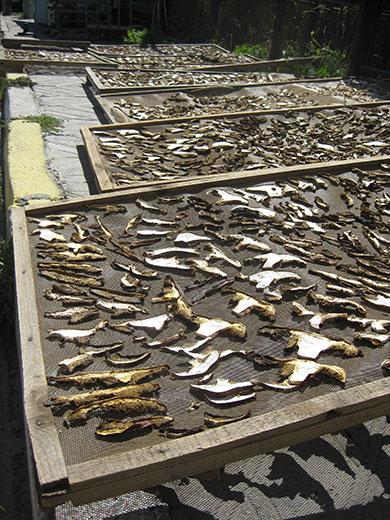What to Drink in Bulgaria
The fountains are a marvel of local social infrastructure; the spouts pour out spring water along almost every mile of mountain roads
/https://tf-cmsv2-smithsonianmag-media.s3.amazonaws.com/filer/20110920065011Off-the-Road-spring-fed-fountains-520.jpg)
The sounds of a Muslim call to prayer echoed through the forest, surprising me as I lay in my sleeping bag in the dark woods just outside the village of Dospat, Bulgaria. Then I recalled having read that clusters of Turks live in the Rhodope Mountains—almost a million people, all told. Many, having faced prejudice, have changed their names. Yet their prayer calls echo proudly on.
I rode south out of Plovdiv into the Rhodopes five days ago—50 miles uphill, through Asenovgrad, Narechenski Bani and Chepelare, in case that helps you orient yourself. It was in the mountain resort town of Pamporovo while picking raspberries by the road that a local man who spoke English approached me and made small talk. I asked how I might maximize my chances of seeing a brown bear. “There are plenty!” he said, leaning back almost in exasperation at the sheer abundance of the things. “Just stick around.” That was four days ago and no bears have materialized, but it’s all right: The high country is reward enough, offering nights just cold enough to be cozy, a general sense of solitude and wildness all around, and ice cold water gurgling from the roadside fountains.
About these fountains: They are a marvel of local social infrastructure. There’s been hardly a mile along any mountain road without at least one stone emitting a spoutof spring water, pure, clean, free and safe to drink. People picnic by these fountains, collect their week’s water from them in five-gallon jugs, douse their heads under them after hiking through the woods all day looking for porcini mushrooms, dump their trash behind them and dunk their feet in them. For the cyclist, especially, these fountains are miracles of convenience; I have not purchased bottled water yet. Which makes me wonder how other people seem to get so thirsty here from simply driving their vehicles. What I mean is, I’ve several times seen cars pull over by these fountains and whole families come spilling out and clamoring for the water, all skirmishing and elbowing to have a slurp as though they had just stumbled out of the Kalahari.
Pine forests share the Rhodope Mountains with grassy pastures, wildflowers and grazing sheep—scenery favored by Bulgarian musicians as backdrops for their music

Sliced porcini mushrooms dry in the sun in the village of Sarnitsa. The mushrooms will be packaged and shipped to Italy. Courtesy of Alastair Bland.
videos (apparent as I watch the local music channel in a Velingrad bar). Villages here are scattered, the streams clear, the cows thick on the highways. Nearly every yard has a beautifully tended garden, with vigorous beanstalks and giant tomatoes reddening in the sun. In many parts, the air smells of fresh sawdust, as logging is big business here. Coming into Dospa, I even passed a billboard showing a chainsaw, magnificent and splendid and awesome, at rest upon a massive tree stump—clearly an essential component of any ambitious lumberjack’s toolbox.
Today I awoke in the woods at the northwest end of Dospat Lake. The call of a new day, of new horizons, and of a hot cappuccino drew me from my moss-soft bed and back onto the Surly Crosscheck. First, coffee in town, then a melon and several bananas for breakfast, and again the endless road. I immediately climbed a thousand feet and at the mile-high pass shared a beer with several painters, at work on the outer walls of a church. Though I gave up on learning Bulgarian 10 days ago when I discovered that the language is written in Cyrillic, that didn’t stop us from discussing life’s simpler matters—like the mycorrhizal relationships between various tree species and mushrooms of the genus Boletus. In Italy, we agreed, porcini mushrooms grow among chestnuts; here, pines. I’ll be watching. I also managed a successful joke: I pointed at my bike and the gear strapped to it: “SUV,” I said, then pointed to my legs: “Motor.” Then to the giant blue bruise on my calf, injured ten days ago in my crash: “Problem mechanica.” Then I raised my beer: “Petrol!” Wide open laughter, a slap on my back, and more beer all around.
Planning Your Next Trip?
Explore great travel deals
Smithsonian magazine participates in affiliate link advertising programs. If you purchase an item through these links, we receive a commission.
/https://tf-cmsv2-smithsonianmag-media.s3.amazonaws.com/accounts/headshot/Off-Road-alastair-bland-240.jpg)
/https://tf-cmsv2-smithsonianmag-media.s3.amazonaws.com/accounts/headshot/Off-Road-alastair-bland-240.jpg)